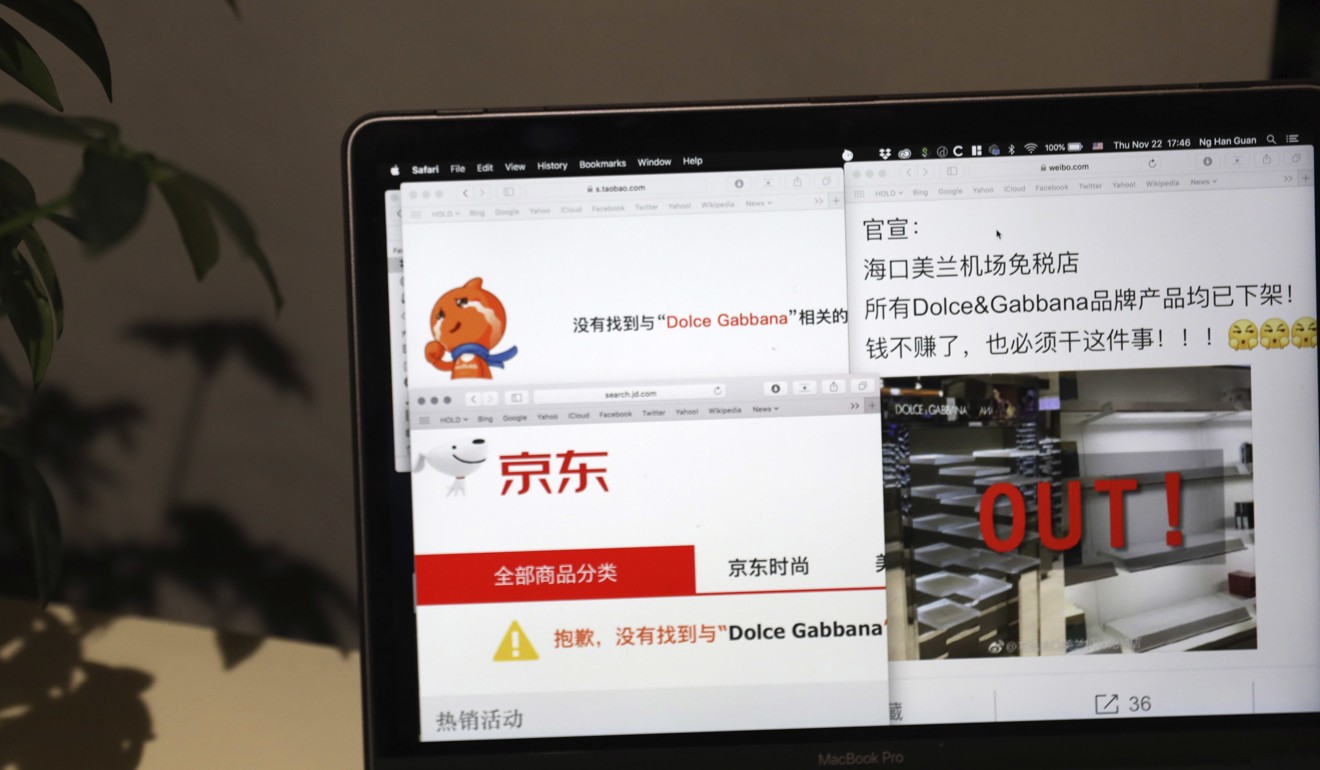
How to make Dolce & Gabbana really pay for co-founder’s anti-China slur
- Luisa Tam says Stefano Gabbana’s foul-mouthed remarks about the country and brand’s misjudged advert suggest apology not worth accepting
- Customers should stay away and hit the company where it hurts
Italian fashion brand Dolce & Gabbana has done it again.
Let me jog your memory: back in January 2012, the fashion house triggered a citywide outrage and a series of high-profile protests after banning Hongkongers from taking photographs outside its flagship store in Tsim Sha Tsui.
The outcry erupted because the D&G store allowed foreigners and mainland Chinese tourists – their target customers – to take photographs of its shopfront, but discouraged local residents from doing so.
The fashion giant later apologised for its insensitivity and things returned to normal not long afterwards.
However, its co-founder, Stefano Gabbana, is notorious for constantly mouthing off with politically incorrect and biased views. He has lashed out at gay adoption, and has long been accused of fat shaming and insulting women by calling some female celebrities ugly.
And yet the fashion label has emerged almost unscathed over the years and recorded soaring sales totalling US$1.5 billion in 2017.

Why? Because we, as consumers, let them get away with it.
Some people, such as Gabbana, believe they have the right to speak freely, but the truth is that freedom of expression does not equate to freedom from its consequences. This means the leader of a high-performance company should act as a role model for accountability and social responsibility.
These are the people whom I would call “habitual racists”; they might not be entirely malicious in their behaviour but they constantly act in a racially biased way out of habit or ignorance, or because they believe in their superiority over other races. And what is worse is we let them form the habit uninterrupted, which means they are acting with our complicity.
The controversial advert featuring a Chinese female model eating pizza and various Italian dishes with chopsticks, which got D&G into this colossal mess in China, is a prime example of habitual racism. Sometimes, cultural humour can fail badly because those at the receiving end might find it inappropriate or, worse, offensive, as was the case here. But what is indefensible is the reaction that came afterwards from Gabbana.
Instead of clarifying and explaining that the advert was meant to be just a tongue-in-cheek marketing gimmick, he managed to single-handedly insult the entire nation by calling China “the country of s***”.
The offending advert might just have been humour in bad taste, but the true colours of racism were on full display by the uninhibited racist remarks from Gabbana.

Moreover, after he had cooled down and come to his senses about the massive damage he had done to the brand, he went against his much publicised arrogant view on free speech and made a public apology with co-founder Domenico Dolce. This was, however, seen by critics as pandering to political correctness in a damage-control exercise conducted with the sole intention of rescuing a gigantic luxury market.
I would say “Apology not accepted”, especially from a man who has long practised discrimination, overt bigotry and misogyny. It cannot be simply dismissed as a series of tactless faux pas.
D&G is a case in point; we should use our consumer dollar to take companies, including global enterprises, to task, and make them accountable for what they do so that they use their power to positively shape social behaviour that can have a constructive impact on society.
Sadly, it isn’t just racist comments and the different kinds of disrespectful behaviour that we need to weed out; we must hold these people accountable. And if they fail, we, as consumers, can take back their power, their arrogance and their sense of superiority by hurting their bottom line.
D&G is struggling to put its products back into stores across China and resume business as usual in the world’s largest growth market for luxury products. In other words, D&G needs to win the public back.
Both company founders said they would never forget this experience, and promised it would never happen again. But we must not forget the company has repeatedly flouted the universal rules of human decency on respecting all races, genders and so forth. Unfortunately, it seems that accepting their apology unconditionally will only encourage discrimination and bigotry to further take hold. So let’s not let them forget this experience so easily, and set an example for others to follow.
Luisa Tam is a senior editor at the Post

